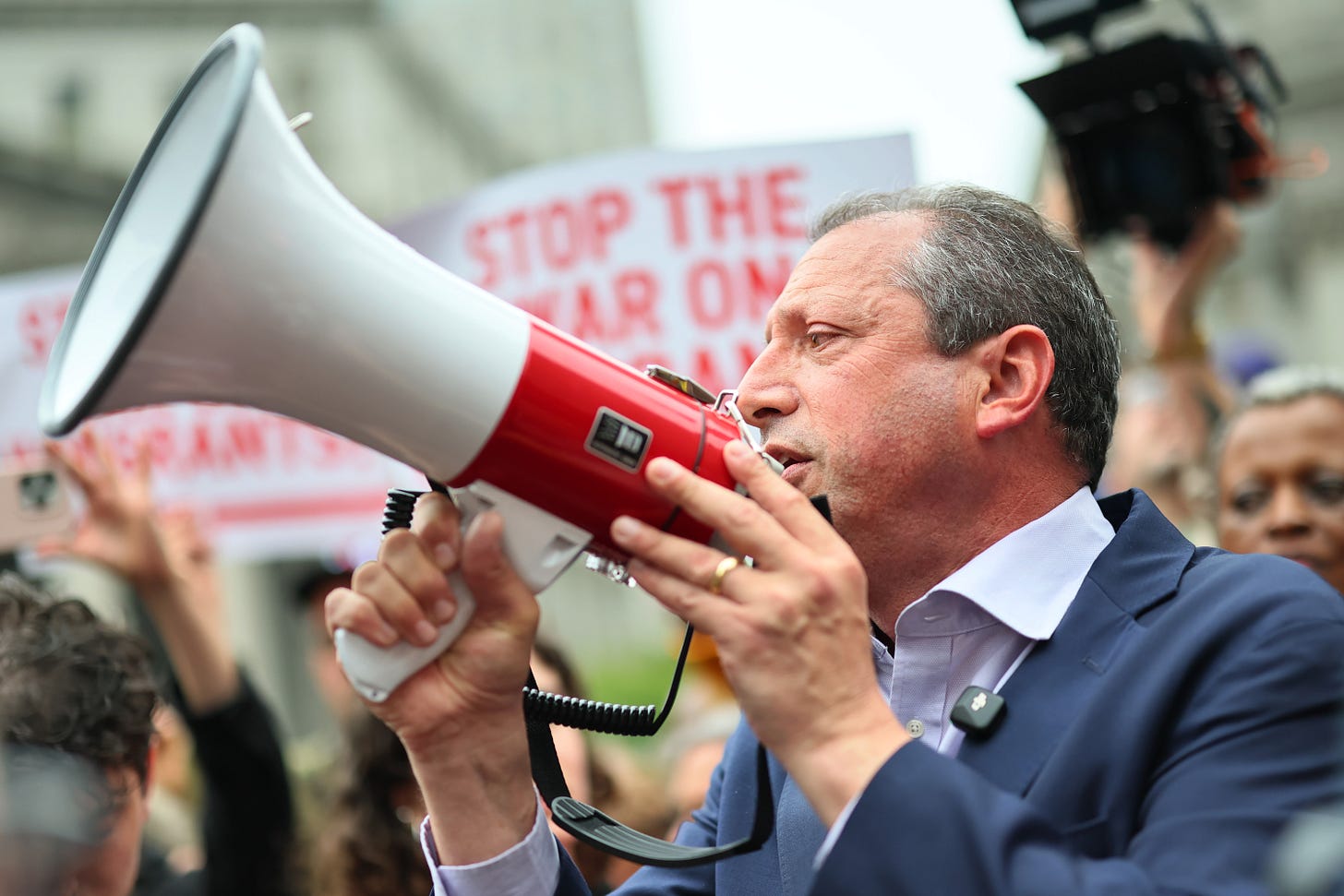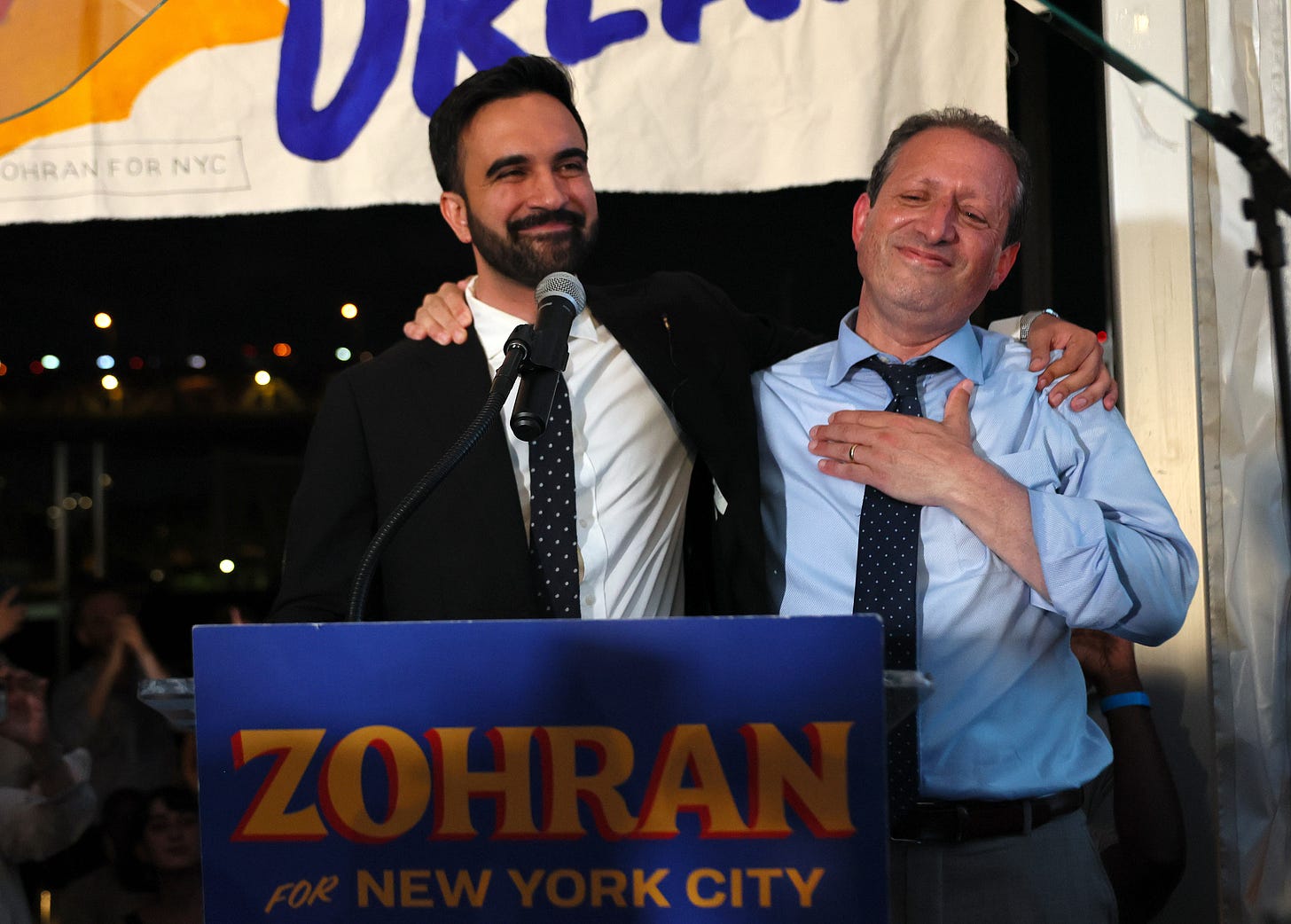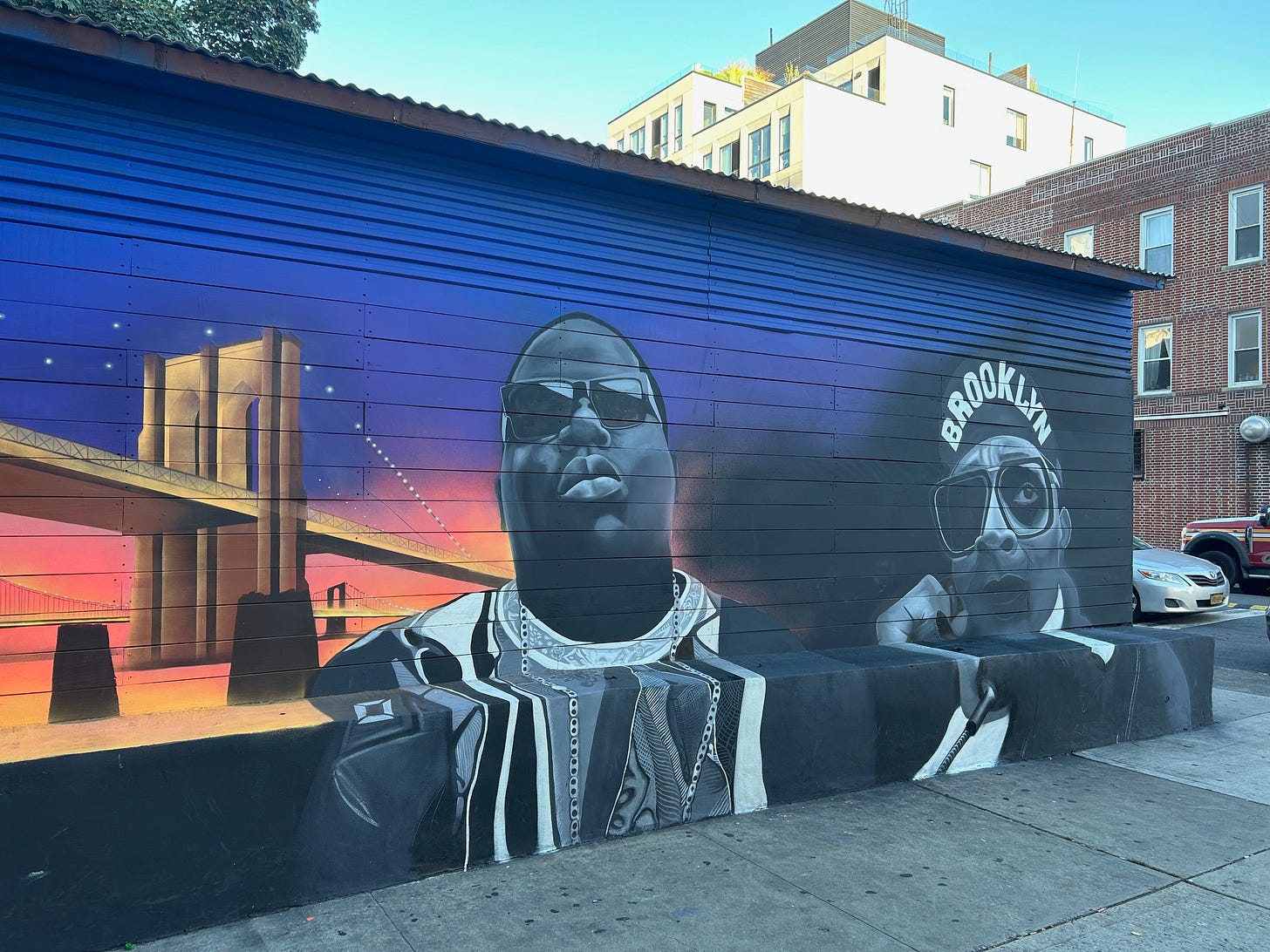Brad Lander Wants New York City to Resist
The NYC Comptroller talks ICE, Trump, Zohran, and Brooklyn.
Brad Lander is one of New York City’s most prominent progressive elected officials. He became the city’s Comptroller in 2022 after serving on the City Council for a dozen years, representing Park Slope and other parts of brownstone Brooklyn. He ran for mayor as a Democrat this year, finishing third behind Zohran Mamdani and Andrew Cuomo. Shortly before Election Day, Lander and Mamdani cross-endorsed one another, forming a left wing bulwark against Cuomo in the city’s ranked-choice voting. Lander has since become a prominent ally and adviser to Mamdani, who is poised to become the city’s first socialist mayor next month.
Long an advocate for organized labor, Lander has become a high profile activist for immigrant rights. He was arrested by federal agents in June while observing immigration court, and again at a sit-in protest against ICE last month. In addition to his official duties supervising the city’s finances, Lander is busy supporting Mamdani’s campaign, planning how to resist the Trump administration, and considering his own political future.
On Friday, we spoke to him in his downtown office about ICE, the Democratic Party, Trump-proofing New York City, and what to do in Brooklyn. Our conversation is below.
How Things Work: Let’s talk about ICE. What could a new mayoral administration do that would tangibly change what’s happening at the ICE headquarters at 26 Federal Plaza, where immigrants have been snatched up after court hearings and detained?
Brad Lander: The best and earliest thing is providing more resources and legal support before people ever get there. Most people who have lawyers are now getting virtual hearings. Most people who are being abducted are there for their very first hearing. They got a notice to appear at the border. And it instructs them to appear in court, and they do. And they don’t have a lawyer, so they just show up. Most people who have lawyers now are requesting virtual hearings, and most of them have been getting those virtual hearings, and then they don’t show up at 26 Federal Plaza at all. They still attend their hearings, but they do it virtually.
Second, when people do get detained—because they don’t have lawyers, people didn’t even know who they were before they went in the building. They’re just lost in the federal system. What their nonexistent lawyers need to do is bring a habeas motion in federal court. That is sadly a depressingly new part of immigration legal services, is bringing habeas motions in federal court. Immigration court is—let’s call it a kangaroo court. It’s not part of the judiciary, it’s part of the executive. So if you are lawlessly abducted within immigration court, you can appeal, but you’re just appealing to the same people who have lawlessly detained you. And that’s why going into federal court, while nothing perfect, at least a federal judge looks and says, “There’s no reason for this abduction.” And many people have been released in a couple of weeks.
Both of those things would be really helpful. And then getting a lot of information to asylum seekers and out in communities through all the networks we have—through the schools, through the libraries, through the public hospitals, through the community based organizations. Right now, the Adams administration is not robustly engaging in outreach. That is something that LA and Chicago, and I think Boston also, are doing much more than New York City is.
In Chicago right now, there are protests at an ICE facility. State police and local police there have arrested protesters, and people are upset because they view that as local authorities cooperating with ICE. To what extent can the NYPD be prevented from cooperating with ICE, even in gray areas like “public safety?”
Lander: We have clear laws on this. If someone has been convicted of a serious or violent offense within the last five years, the law provides for the possibility of cooperation. Anything else, we are not supposed to be cooperating. The Department of Investigation just found last week that the Department of Correction had violated that, and that while the violation was by individuals, they have been given no training on what their obligations were. There’s reason to believe NYPD has done the same in a couple of cases where investigations are underway, but we have not yet seen the results.
So first, just making sure that New York City’s law enforcement agencies understand the law and don’t participate in more direct cooperation is critical. Now, this issue you’re referring to of, “What do you do around something that’s not directly cooperation around an individual, but a situation? Where’s the line?” When we got arrested two weeks ago [while asking for access to ICE detention cells at 26 Federal Plaza], a dozen of us were upstairs inside the building, and Federal Protective Services agents arrested us. Downstairs on the street, it was NYPD officers who arrested the Public Advocate and the 70 or so New Yorkers who were sitting in. I don’t think anyone here objected—that was planned, nonviolent civil disobedience. They knew they were going to be arrested. I mean, there might be questions about how the arrests were handled..
I think you’re raising a really interesting question. And this a question for mayor-to-be Mamdani, but it’s also a question for all of us. When Trump sends troops here, how will we stand up to them insistently and make clear New York doesn’t need them, New York doesn’t want them, New York is resisting them—but also in a way that is in the tradition of nonviolent civil disobedience, but also in a way that just shows how great New York City is? I think that’s an important set of questions. In the recent No Kings marches, the vast majority of marshals are provided by the marchers. Those marches have been the least policed by the NYPD of large marches that I’ve seen in quite some time. And that’s under Eric Adams! Zohran has made clear he wants to take an approach to protest policing that is much less heavily reliant on the NYPD, that disbands the [Strategic Response Group].
So what will it look like to have people protesting and resisting, to have the NYPD on the side of New York City, and not on the side of our federal occupiers? That’s an important question.
One experience I think a lot of regular people have had during this Trump administration is: When Trump started doing all this lawless stuff, people turned to their elected officials—and then they began to realize that our elected officials didn’t seem to have a lot of effective tools to use to stop him. When I see elected officials doing civil disobedience, my first thought is “That’s great.” But my second thought is, “Uh oh, does this mean that the elected officials don’t have any better tools to use than the rest of us?” What’s your experience been with that dynamic?
Lander: Well, are our tools adequate to confronting rapidly advancing authoritarianism? No, they’re not adequate. That I think is pretty straightforward. Are they important and powerful in the face of it? They are. On the one hand, I have been exactly what many New Yorkers who are not elected officials are doing: showing up and attending these hearings, bearing witness, making sure that people know their rights, peaceful accompaniment. As an elected official, I’m able to bring some additional attention and spotlight to these issues. Lots of people have told me they’ve come and showed up there themselves as a result.
I did write a letter to the mayor saying, “I think in addition to what’s happening on the 10th floor [where the ICE detention center is] being a violation of federal law, I’m pretty sure it’s a violation of local law.” They don’t have a building permit to do what they’re doing on the 10th floor! We should enforce against it. This is a problem of Eric Adams, not of weak local tools, that he didn’t even try. What would have happened if building inspectors or FDNY officers had gone to the 10th floor? Would they have been not allowed? I don’t know. Had they been allowed, would the fact that a fire inspector said “you’re committing a fire code violation” have actually dramatically disrupted the mass deportation machine? No, but…
Will we get to find out?
Lander: I hope. These are the kinds of things we could do. In Chicago, when they sent the salt trucks out, it wasn’t that the salt trucks physically blocked the troops from coming in, but they played an important role in rallying Chicagoans. And yes, I think had FDNY gone, or when Mayor Mamdani’s FDNY inspectors go to inspect building and fire code violations on the 10th floor, is that going to be adequate to protect our immigrant neighbors? Not by itself, no. But there are important tools we all have. Eric Adams is choosing not to use them.
The Trump administration said this week it’s going to withhold $18 billion in infrastructure funding from New York City under the pretext of opposing DEI. What’s the plan for addressing that? And more broadly, if the courts ultimately allow the administration to put these political strings on funding for everyone from universities to school districts to cities, how should the City of New York navigate that going forward?
Lander: First I will say, we have this question of “When are we in a constitutional crisis?” And one answer is, “we’re already well in a constitutional crisis.” But I think that gets at that there are different kinds of lines to cross. The administration has so far played footsie with the refusal to obey what federal judges have said. But most of the time they have heeded what federal judges have said. Then they’ve done these selective clawbacks, like taking the $80 million they owe us from FEMA [grants for migrants]. Which eventually, I’m confident, a court will rule we’re supposed to get back, but they’ve had it since February.
They can do enormous harm in ways that are hideous, but not unconstitutional. If Trump is cutting off everyone’s infrastructure funding, that’s outrageous, but it might well withstand a court challenge. The executive gets more power to decide what to disburse and what not to disburse in a shutdown. And choosing something broad, while very damaging to cities and states and the American people, that’s different from saying “I’m trolling Democrats by cutting off their infrastructure funding.” Which will not survive in federal court—or if it does, is a different level of constitutional crisis. So being in court with the best lawyers very aggressively is critical. Because I just want to make a distinction between the reality of having to deal with substantially less money in a world where everyone is, versus things that are just patently illegal. That requires a kind of collective ratcheting up. If they go down a place where they starve the cities led by Democrats of the funding everyone is getting, and other cities in red states are continuing to get their funding, that’s an elevation that’s challenging. We definitely need to be ready to deal with funding clawbacks and shortfalls—both in litigating them, and also navigating them from a cash flow point of view. And that’s why I was angry that Eric Adams and the City Council didn’t increase the city’s general reserve by a billion dollars, and put a billion dollars more in our rainy day fund in June. This was a time for doing that. Everyone’s talking about, quote-unquote “Trump-proofing” the city.
Trump’s been a huge union buster of public sector workers, and he’s effectively shut down the NLRB, which is supposed to be protecting worker rights nationwide. A lot of the action in labor rights now will have to be on the state and local levels. Have you thought about things that New York City can do on that front?
Lander: The Secure Jobs Act [which would give “just cause” protections to all workers] would be a significant way of doing that that just protects workers from being fired without a good reason. We have a modest, in nonprofits, contracting provision for labor peace, but the labor peace provisions of contracting requirements could be significantly strengthened. The city’s Department of Consumer and Worker Protection could be proactive in letting people know about their rights to organize, and investigating where there may be violations. Absolutely.
Of the big New York City unions, some of them are progressive, but many of them are much more transactional, politically. Do you think the fact that Zohran won is going to pull some of those big unions left?
Lander: I think that Zohran as mayor will likely pull some unions left, and Donald Trump as president will also likely shove some of those unions left. Too little of that has happened already though. I wish we were seeing bolder labor leadership against creeping, rapidly advancing anti-worker authoritarian federal government.
You and me both. Are you going to take a role in a Mamdani administration?
Lander: Not too soon for you to ask, but too soon for me to answer.
What are your thoughts on the Democratic Party’s lukewarm-at-best reaction to Zohran’s primary victory?
Lander: Let me praise people who have endorsed him: Governor Hochul, Carl Heastie, Andrea Stewart Cousins… I’m not the loudest cheerleader for Ken Martin, but he has made clear the DNC is supporting Zohran. Really I’m pleased with Pat Ryan. He’s being a such a model for a front line Democrat in a more moderate district signaling the need to build a broad Democratic coalition. So there are some people doing it. There are some people doing it the opposite, who are weakening broad Democratic efforts. I knocked doors for both [New York Democratic Congress members] Tom Suozzi and Laura Gillen. Because while I don’t have their politics, they were the right kinds of Democrats to win their districts. So for them to turn around and say that we don’t belong in the party—is dangerous! They can’t see what time it is. That’s not gonna help them win, but I do think it is helping Democrats lose.
And then, yes, I absolutely wish that Senator Schumer and Leader Jeffries would endorse Zohran, would follow the lead of the governor and Congressman Ryan and others who care passionately about the project of winning front line districts next year. I care passionately about the project of winning front line districts next year. We have to. I’m proud to support Zohran for mayor, and I want to be running candidates in front line House seats and for Senate in purple states who can win in those places. But the failure of Democratic leaders to endorse him, to me, will not help one iota front line candidates win. Republicans will try to hang progressives around the necks of front liners every day. So on the one hand it doesn’t help us win those seats, and on the other hand it weakens unity at a time we urgently need it.
BONUS: Five Questions About Brooklyn With Brad Lander
Best rapper from Brooklyn?
Lander: Um.. I guess you gotta spread love, it’s the Brooklyn way.
[VERDICT: TRUE]
Best restaurant in Brooklyn?
Lander: My favorite right now is Masalawala, on Fifth Avenue. The most undiscovered one is a place called Village Cafe, it’s an Azerbaijani place on Coney Island Avenue.
[VERDICT: FINE]
Best train line in Brooklyn?
Lander: I mean, the F takes me home.
[VERDICT: NO. WE WERE LOOKING FOR THE Q]
Best thing to do at Coney Island?
Lander: My daughter and I were there on Wednesday, imagining what it would take to restore the Parachute Drop to be a ride. I mean, riding the Cyclone while eating a hot dog is the best thing to do on Coney Island. But maybe one day, the Parachute Drop.
[VERDICT: TRUE]
Coolest neighborhood in Brooklyn?
Lander: I’m gonna say Kensington. I represented it for many years.
[Derisive, unprofessional laughter from interviewer]
[VERDICT: FALSE. WE WERE LOOKING FOR FLATBUSH]
Also
Previously, in How Things Work interviews: Zohran Mamdani; Shawn Fain; Sara Nelson; Gwen Mills; Tom Scocca; Jeff Schuhrke. Previously, in NYC politics: Up With Zohran; New York Socialist City; The Subway Is Not Scary.
If you, too, wish we were seeing bolder labor leadership against authoritarianism, you might enjoy my book “The Hammer,” which details why we are not seeing that, and how we might one day see it. Available for order wherever books are sold.
Thank you all for being here. Thank you, especially, to those of you who are paid subscribers to How Things Work. This site has no paywall and no corporate sponsors. It exists solely due to the support of readers just like you who like to read it, and therefore choose to become paid subscribers for $6 a month, or $60 a year. If you can chip in to support independent media here, I appreciate you. If not, just keep coming back.





I really appreciated this interview. I think you asked the right questions, and in many cases you got a decent answer. I still think we're going to be facing some very serious questions about how to resist, especially when the methods that people are reaching for are trying to use a system that's broken against itself. I wish I could be more optimistic. Also, I love the just for fun bonus questions! Have I mentioned lately how happy I am to be a paid subscriber? I am, and I encourage others to do so if they can afford it.
Thank you. This kind of vigor is contagious. Thank you, dear and vigilant Hamilton.